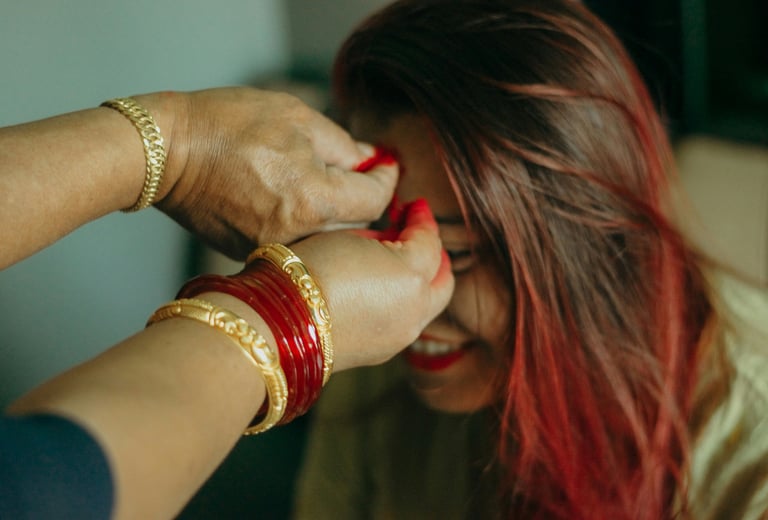Tension During Dashain-Tihar? How to Manage Family Expectations & Holiday Stress in Nepal
Feeling stressed instead of festive? Learn practical ways to manage family pressure, financial strain, and emotional exhaustion during Nepali festivals like Dashain and Tihar.
Dipin Bhattarai
4/22/20253 min read


"Dashain ma ta aamma sangai basna aunu parcha," "Tihar ma yo ghar ma jaada bihe ko kura uthcha," "Dherai kharcha bhayo, mahinau bhari installments tirna parne."
Do these thoughts sound familiar? In Nepal, our festivals—Dashain, Tihar, Chhath, Eid, Christmas—are meant to be times of joy, togetherness, and celebration. But for many, they also bring a unique set of pressures, leading to significant holiday stress and family tension.
If you find yourself feeling anxious, exhausted, or irritable instead of festive, you are not alone. The gap between the expectation of perfect happiness and the reality of complex family dynamics and financial strain is very real.
This guide offers practical ways to navigate festival and stress in a Nepali context, so you can reclaim the joy of the season.
Why Do Festivals Feel Stressful? The Nepali Context
The pressure comes from multiple sources, often unspoken:
Financial Pressure: The cost of new clothes (luga), gifts, feasts, meat, alcohol, and travel can strain budgets. The pressure to give Dakshina to younger relatives during Dashain is a significant source of anxiety for many earners.
Family & Relational Dynamics: Festivals force interactions with extended family. This can bring up old conflicts, unsolicited advice about your career or marital status, and the constant pressure to perform the role of a "happy family."
The Burden of "Tradition": The workload of preparation—cleaning the entire house, cooking elaborate meals for dozens of guests, performing rituals—often falls disproportionately on one person (usually the women of the household), leading to exhaustion and burnout.
Emotional Triggers: Festivals can be a painful reminder of loved ones who are no longer with us, or of relationships that have soured.
Practical Coping Strategies for the Nepali Festival Season
1. Set Realistic Expectations
Accept that no festival is perfect. There will be messy moments, disagreements, and maybe even a burnt sel roti. That's okay. Let go of the social media-fueled ideal of a "perfect" celebration and embrace the real, imperfect one with your family.
2. Manage the Financial Load
Create a Budget: Before the festival begins, decide on a realistic budget for gifts, food, and travel. Stick to it. Remember, the value of a gift isn't in its price tag.
Normalize Simple Celebrations: Suggest a potluck-style meal where everyone contributes a dish. It reduces the burden on the host and makes everyone feel involved.
3. Set Gentle Boundaries
You don't have to say yes to every event or endure toxic conversations.
For Personal Questions: Have a polite but firm response ready. For example, "Yes, I'm thinking about marriage/career. I'll let you know when there's news! How have you been?" and change the subject.
For Time Management: It's okay to excuse yourself from a gathering for some quiet time. A short walk or 10 minutes alone in a room can be a great reset.
4. Share the Workload
Festival stress is often housework stress. Make preparation a family activity, not a one-person show.
Delegate tasks: one person handles the decorations, another the grocery shopping, and the kids can help with the rangoli or lighting diyos.
This shared responsibility fosters teamwork and reduces resentment.
5. Schedule "You" Time
Amid the chaos, intentionally carve out 15-20 minutes for yourself. Use this time to:
Practice deep breathing (Pranayama).
Listen to a calming song.
Write down your feelings in a journal.
Simply sip a cup of chiya in silence.
This small act of self-care can prevent emotional overload.
6. Focus on the Meaning, Not the Hustle
It's easy to get lost in the doing and forget the being. Remind yourself and your family what the festival is truly about for you.
Is it gratitude?
Is it the joy of having everyone under one roof?
Is it the light winning over darkness?
Anchor yourself in that meaning when things get chaotic.
7. Acknowledge Grief and Loss (दुःखलाई ठाउँ दिनु)
If you are missing someone, it's okay to feel sad. Honor their memory. Light a diyo in their name, share a favorite story about them, or visit a place they loved. Allowing space for grief can be a part of healing during the festivities.
Remember: It's Your Festival Too
The ultimate goal of any festival is connection and joy, not exhaustion and debt. By setting boundaries, managing expectations, and prioritizing your mental health, you can protect your peace and actually enjoy the time with your loved ones.
This year, give yourself the gift of less stress.That too is a gift for the festival.
How do you manage stress during festivals? Share your own tips and experiences in the comments below to help others in our community navigate the season more peacefully.
contact@manosansar.com
© 2025. All rights reserved by MANOSANSAR NEPAL.
📄 Quick Links:
🔹 About Us
🔹 Our Programs
🔹 Get Involved
🔹 Donate
🔹 Contact Us
🔒 Privacy Policy | 📜 Terms of Service
